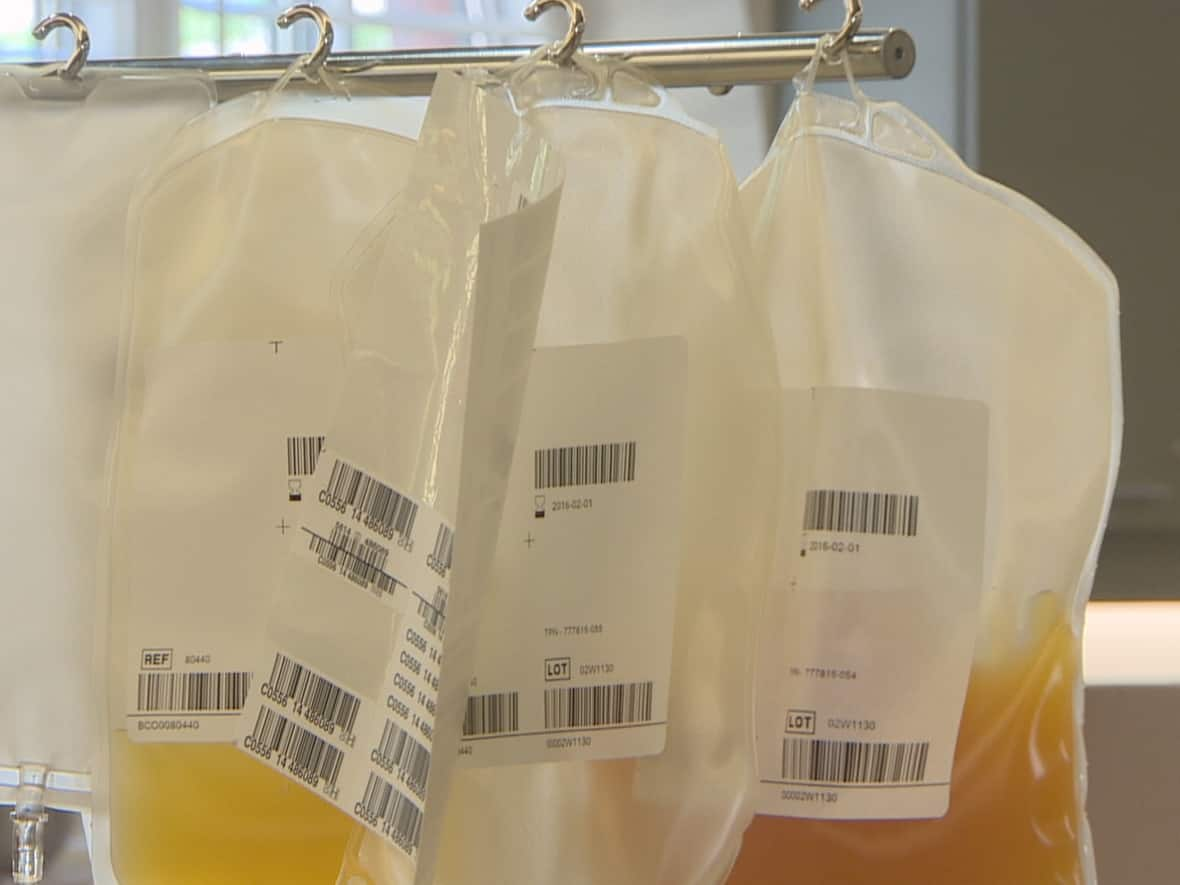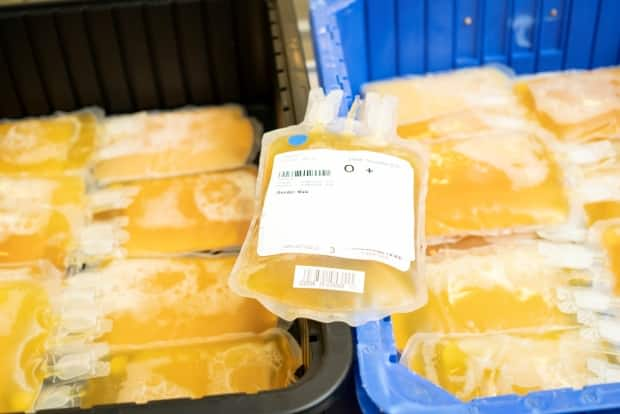Canadian Blood Services signs agreement with private company to boost national plasma supply

Canadian Blood Services (CBS) is partnering with a private healthcare company to boost Canada's national blood plasma supply, the organization announced Wednesday.
After reviewing an undisclosed number of proposals, CBS has signed an agreement with Grifols, a company headquartered in Spain, which specializes in producing plasma medicines, the national blood collection organization said in a news release.
"This agreement very importantly has built into it the important protections and safeguards that the national blood system needs to ensure plasma collected in Canada stays in Canada to serve Canadian patients and that there are no negative impacts on the blood system that we operate today," said CBS CEO Dr. Graham Sher at a news conference Wednesday.
Grifols will help CBS meet national targets for plasma supply by both collecting paid-for plasma and by turning Canadian plasma into immunoglobulins —a form of specialized medications called plasma protein products– for Canadian patients.

The agreement comes as CBS says it is struggling to meet national supply demands for plasma, the protein-rich liquid in blood that helps blood components circulate throughout the body.
It is used by people with immune deficiencies and rare blood disorders, kidney and liver diseases, various cancer patients and others, according to CBS.
Health Canada says on its website there's currently "not enough plasma collected in Canada to meet the demand," and most of the plasma products distributed by CBS and Héma-Quebec are purchased from U.S. manufacturers and made from U.S. paid-donor plasma.
Some advocates say CBS didn't do enough to boost voluntary donations in Canada before calling upon commercial partners.
"It is very confusing why Canadian Blood Services would secretly make this deal with a private pharmaceutical company which directly undermines their mandate, instead of expanding on our own plasma collection plan," said Kat Lanteigne, executive director of BloodWatch.org, a not-for-profit organization that advocates for a safe and voluntary public blood system in Canada.
CBS collecting only 15 per cent of plasma needed
Plasma is primarily used in two ways in the country: It can be transfused into people directly at hospitals and can be made into specialized medications like immunoglobulins.
CBS currently relies on plasma donations to meet national demand. But it only collects about 15 per cent of the plasma needed, according to its website.
WATCH | Plasma donations in Canada fall far below need:
As a result, it bulk buys plasma protein products, including immunoglobulins, from the global market to meet the remaining national demand.
CBS recently opened up 11 plasma donor centres in Ontario, Alberta and B.C. to try and boost how much is collected by donation in Canada.
With those new centres, CBS is on track to hit about 25 per cent of the national supply, a CBS spokesperson said last month.
But it's still falling short of its target, so it came up with recommendations on how to get more plasma. Among those recommendations was to increase supply through not-for-profit and commercial sectors.
Through its newly signed agreement with Grifols, the national blood collection organization will be able to reach "a minimum target of 50 per cent sufficiency in the shortest time possible," according to a news release.
Grifols' will collect paid-for plasma to achieve the remaining 25 per cent.
This agreement means Grifols will open an unknown number of plasma collection centres in Canada. It acquired its first plasma donation centre in Canada earlier this year.

CBS is also planning to open three collection centres in B.C. and Ontario in 2023 and three more centres in 2024 to further boost the amount of plasma collected in the country.
Sher says there is "market potential for expansion" of both CBS centres and Grifols. He went on to say that CBS is confident it can grow the number of donors even with Grifols operating in Canada.
"They will be operating in areas where we are not operating now," Sher said.
The 15-year agreement with Grifols specifies that none of the plasma collected in Canada, nor the immunoglobulins made by Canadian plasma, can be sold internationally.
CBS also specified in their news release that it won't be purchasing raw plasma from Grifols but specifically finished immunoglobulins.
The agreement brings a range of opinions, with some leaders of patient organizations quoted in the national blood organization's news release in support of CBS' agreement with Grifols.
"We have long advocated for an approach that includes working with the commercial sector to ensure Canadian patients have access to life-saving plasma-derived medicinal products when needed. Increasing Canada's plasma sufficiency to at least 50 per cent is critical in ensuring that access," said Jennifer van Gennip, executive director of the Network of Rare Blood Disorder Organizations, a coalition of national patient groups representing people with rare blood disorders.
But Lanteigne says the agreement is problematic because of the commercial model of plasma collection.
"What this actually does is it forces Canadian patients onto commercially-sourced plasma, which we know is predominantly collected from the most vulnerable communities. That is adamantly in contrast to the mandate of Canadian Blood Services," she said.
On Tuesday, the Canadian Health Coalition denounced CBS's decision and called for the dismissal of CBS' CEO and board of directors to "recommit to the voluntary public mandate" of CBS.
BloodWatch.org is also calling for the dismissal of current CBS staff and the cancellation of the Grifols agreement.
"The health ministers need to step in and need to hold Canadian Blood Services leadership accountable because they appoint those board members," Lanteigne said.
"Arms-length doesn't mean not accountable. Members of the public and the ministers themselves I don't think they yet recognize what Canadian Blood Services has done."
On its website, Grifols says it's working with CBS towards "steadily increasing sourcing of the Canadian plasma necessary" so that volumes reach 2.4 million grams of immunoglobulin annually by 2026.
Grifols will produce the protein products in North Carolina until its Montreal facility is fully operational in 2026. It will be the only large-scale commercial manufacturer of plasma products in Canada.


